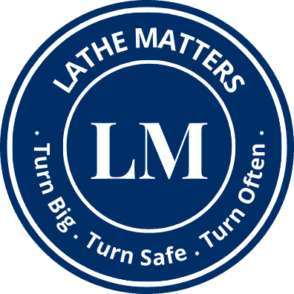Disclaimer: As an Amazon affiliate, I may earn a small percentage from qualifying purchases. This is at no extra cost to you. Learn more here.
Midi lathes are a favored choice among woodturners due to their balance of motor power, compact size, and affordability. These machines offer the perfect blend of functionality and efficiency. Typically featuring a bed or lathe swing of 12-14 inches, midi lathes provide ample torque, speed, and horsepower, all in a space-saving design that fits conveniently on a lathe stand.
Here’s a review of five top-performing midi lathes that have set the benchmark in the woodturning industry.
Top 5 Midi Wood Lathes of 2025 in a Quick Chart
Last update on 2025-04-16 / Images from Amazon Product Advertising API
Best Midi Wood Lathes Table of Contents
Let’s dive into detailed reviews of these standout models.
Best Midi Wood Lathes Ranked
The Overall Best Midi Wood Lathe: Jet JWL 1221VS
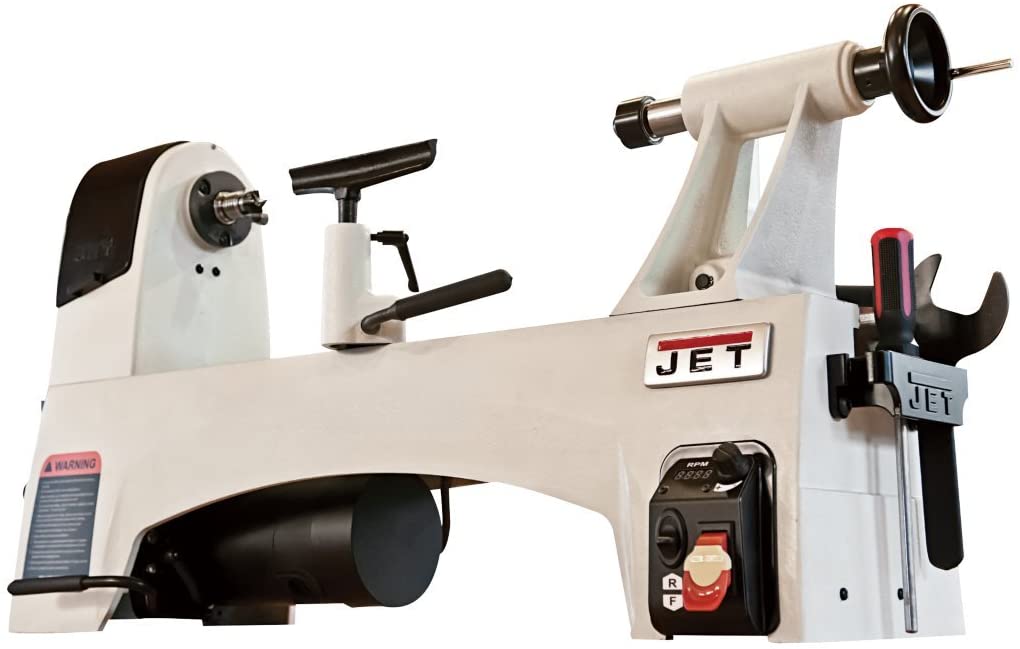
- 12″ swing and 20-1/2″ between centers
- 1 HP, 115V, Recommended Circuit Size (Amps.)10
- Spindle Taper: MT2
- Spindle Bore: 3/8″
- Indexing position: 24
- Spindle Thread: 1″/8 TPI
- 60-3600 RPM variable speed
- Forward to reverse
- Weight: 136.4lbs
- Warranty: 5 years
This lathe offers a 12-inch swing and 20.5-inch between centers, making it ideal for bowl turning and other mid-size projects. With a 1 HP motor, it operates at variable speeds between 60-3600 RPM, making it versatile for different types of woodturning tasks.
The Jet JWL 1221VS is a solid choice for beginners and seasoned wood turners alike. With a one-horsepower motor, this lightweight beast outperforms competitors like the Rikon 70-150VSR and Delta 46-460 thanks to its slow 60 RPM for irregular bowl blanks, a speed rivaling heavy-duty models like Laguna Revo 1836.
Jet designed this lathe with serious turners in mind. I’ve had mine since 2015, and it’s still going strong. The pulleys on this variable-speed machine aren’t just for show—they deliver the extra torque needed when turning larger, heavier pieces.
Safety’s a win, too—the control panel is on the right, keeping you safe while you focus on the work. The digital readout is a bonus, making precise speed adjustments effortless.
If you’re stepping up from a mini lathe or just getting started, this Jet model is worth every penny. My buddy Larry Edwards has been using his for nearly three years and loves it, as you can see from his project ideas posts.
Key Features
- Powerful Performance: The slowest speed of 60 RPM makes it perfect for turning irregular bowl blanks.
- Torque Control: Pulley settings offer enhanced torque, which is crucial for larger workpieces.
- Convenient Controls: The right-side control panel ensures safer and more comfortable operation.
- Digital Readout: Allows for precise speed adjustments.
Why It Stands Out
Despite the additional cost compared to models like Rikon or Delta, Jet’s quality and thoughtful design justify the investment. The new 1221SP step pulley version is a worthy upgrade option.
Concerns & Solutions
- The tool rack can obstruct the pulley door. If you have a separate tool holder this is not a big deal.
- The forward/reverse switch may be confusing initially. Take a close look to make sure it’s in the mode you want.
- While the slow speed pick-up may irk professional turners, it enhances safety.
The Runner-Up: Delta 46-460
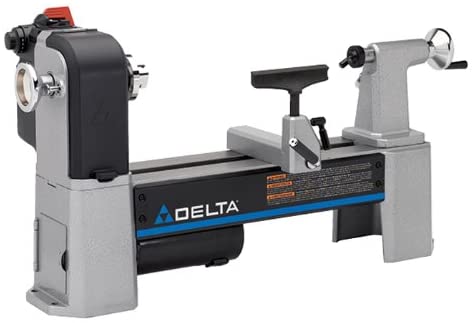
- 12.5″ swing and 16.5″ between centers
- 1-HP, 1-Phase, 120V, 60-Hz, 1725 rpm motor
- Speed: 250-700, 600-1,800 and 1,350-4,000-RPM
- Electronic variable
- Head and Tailstock Taper: #2 MT
- Drive spindle: 1 inch -8 RH TPI thread
- Forward and Reverse
- Weight: 97 lbs
- Warranty: 5 years
Delta is a heavyweight name in woodworking, and their 46-460 lathe is a fan favorite—and top seller for good reason. With a quiet, smooth-running 1 HP motor and a 12.5” bed swing, it’s built to handle medium-sized bowl projects and is a dream for spindle work enthusiasts.
Delta’s journey started with the ¾ HP 46-450, which they leveled up to this 1 HP powerhouse. The vibration-free whisper-quiet operation is impressive, making every turn smooth and enjoyable.
Adjustments are a breeze with an easy-to-position tool rest, tailstock, and spindle speed controls—key features Delta nailed, setting the standard for compact lathes. They even packed in perks usually reserved for full-size models, like a handwheel and indexing pin, raising the bar for compact machines.
The three-step pulley system paired with a 1 HP motor cranks out enough torque to handle blanks up to 11 inches, though they market it for 12 inches—better to play it safe on size.
If you’re after a solid lathe without a big price tag, this one’s a winner. Many shops use it as a backup when a full-size lathe just isn’t practical. Toss on a bed extension, and you’ll be turning like you’re on a big rig.
Key Features
- Speed Range: Three-speed settings (250-700, 600-1800, 1350-4000 RPM) offer flexibility.
- Durability: The vibration-free, quiet operation is a standout feature.
- Compact Design: Ideal for small workshops.
Why It Stands Out
The Delta 46-460 is often favored for its quiet operation and precision. The addition of a bed extension transforms it into a full-size alternative.
Concerns & Solutions
- The ⅝-inch tool rest can be limiting for larger workpieces. Swapping it out for another tool rest that is compatible with this lathe is an option.
- Along with some switch problems, parts availability has been a concern in the past. Delta’s customer service team is responsive.
- The live-center and spur-center might not feel sturdy enough for a serious woodturner but are suitable for handling most of the work.
Best for Bowl Turning: RIKON 70-150VSR
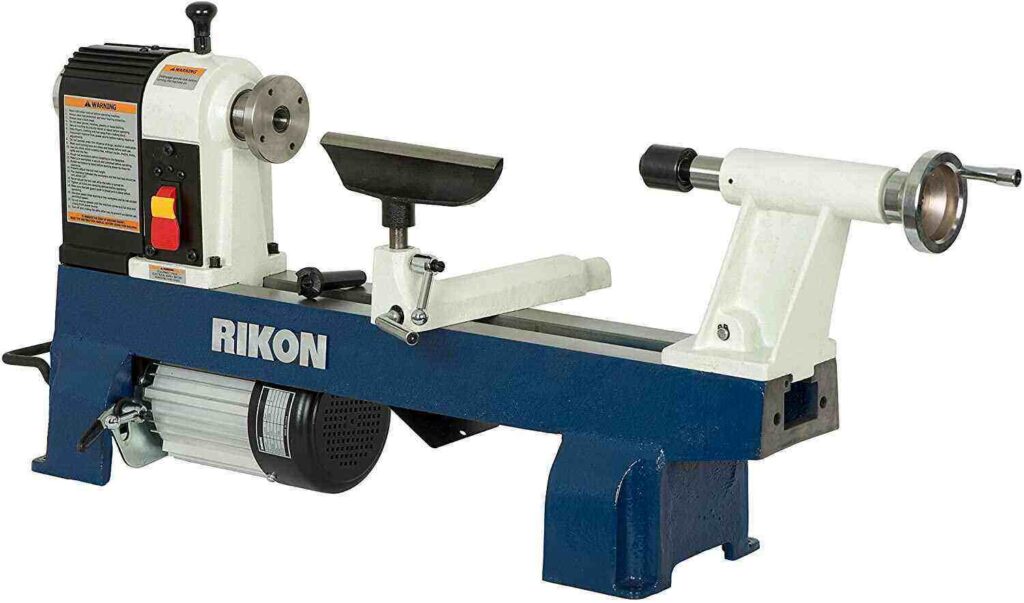
- 12.5″ swing and 20″ between centers
- 1-HP, 1-Phase, 120V, 60-Hz, 2,900 rpm motor
- Speed: 250 – 750, 550 – 1,650, 1,300 – 3,850
- Electronic variable
- Head and Tailstock Taper: #2 MT
- Drive spindle: 1” x 8
- Forward and Reverse
- Weight: 95 lbs
- Warranty: 5 years
Rikon built this lathe to stay ahead in the competitive midi lathe market—and they nailed it. This 120-pound, 1 HP (250-3850 RPM) powerhouse brings all the features you’d expect from a top-tier lathe, making it hard to overlook.
With electronic variable speed, an LED display, and a Forward/Reverse function, this sturdy workhorse is built to last. The 24-position indexing head adds versatility, and the 250 RPM low speed is a game-changer for bowl turners.
What really stands out? The 1-inch diameter tool rest—way stronger and more stable than the typical ⅝-inch, giving you confidence during every cut. Plus Rikon’s customer service has earned a reputation for being responsive and efficient, unlike some competitors where long waits for parts have turned loyalists away.
This is hands down one of the most positively reviewed midi lathes I’ve seen—and for good reason.
Key Features
- Speed Range: 250-3850 RPM with electronic variable speed.
- Tool Rest: A robust 1-inch diameter tool rest provides added stability.
- Customer Service: Timely support and prompt issue resolution.
Concerns & Solutions
- Early issues with the controller circuit board were resolved by Rikon.
Best Value for the Money: Grizzly Industrial T25920
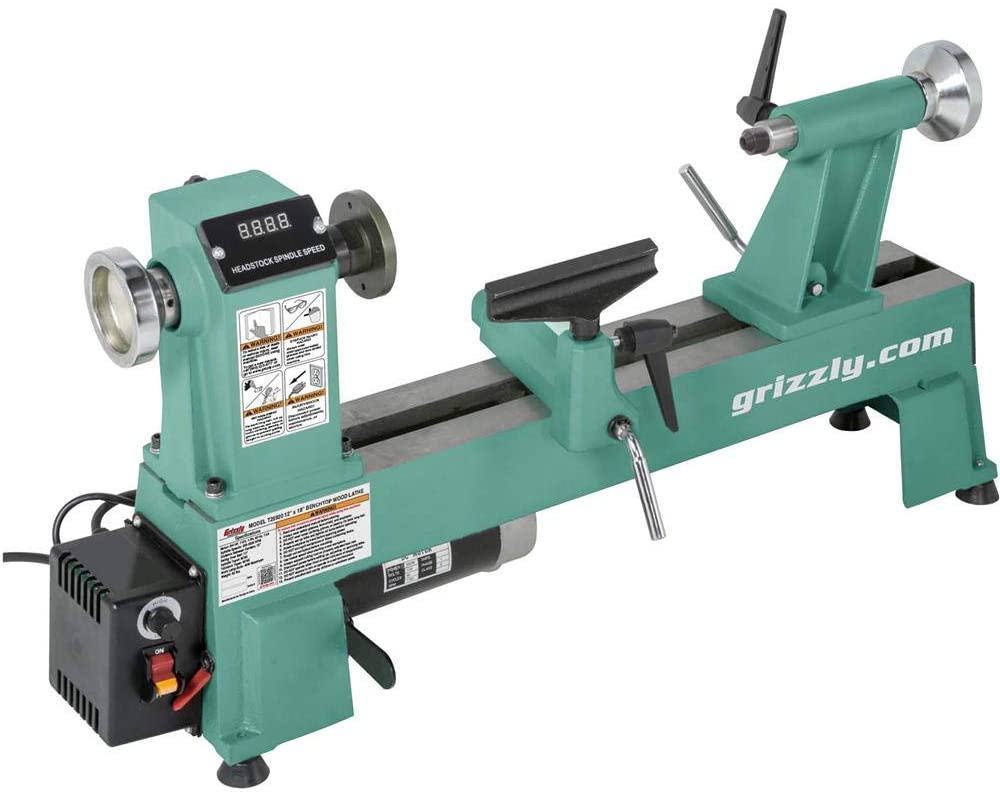
- 12″ swing and 18″ between centers
- Motor: 3/4 HP, 110V, single-phase, 5.3A
- Speed: 650- 3800 RPM
- Variable speed
- Swing over tool rest base: 9-1/2″
- 5-7/8″ Tool Rest with 5/8″ Post
- Spindle tapers: #2MT
- Tailstock taper: #2MT
- Spindle thread: 1″ X 8 TPI RH
- Weight: 84 lbs
- Warranty: 1 year
The 650 RPM startup speed might seem a bit fast for turning out-of-shape bowl blanks, but thanks to the motor’s solid torque, it handles the job just fine—just keep those chisels razor-sharp.
For spindle work? This lathe hits its stride, making baseball bats, table legs, tampers, and similar projects a breeze. The 3/4 HP motor covers speeds from 650 to 3800 RPM, though the digital readout tops out at 4000 RPM, giving you an unexpected bonus.
Speed adjustments are smooth with an easy-to-use knob, a welcome upgrade from the clunky, heavy knobs or belt changes found on older models. The #2 MT spindle and tailstock taper make operation straightforward and user-friendly.
If you want a complete workshop setup, you can add a bed extension and stand, though that’s totally optional if you’ve already got a bench.
The feedback? No red flags—no motor bogging, no durability concerns, just reliable performance. It’s a solid budget-friendly lathe I’d recommend to anyone looking to get turning without breaking the bank.
Key Features
- Speed Range: Variable speeds from 650-3800 RPM.
- Compact and Sturdy: Ideal for spindle work.
Concerns & Solutions
- The lowest speed (650 RPM) is fast for turning out-of-shape blanks, but it’s still manageable.
- Ensure proper alignment and inspection upon unboxing. Grizzly has great customer service if you encounter any issues.
Best for Portability: Shop Fox W1836
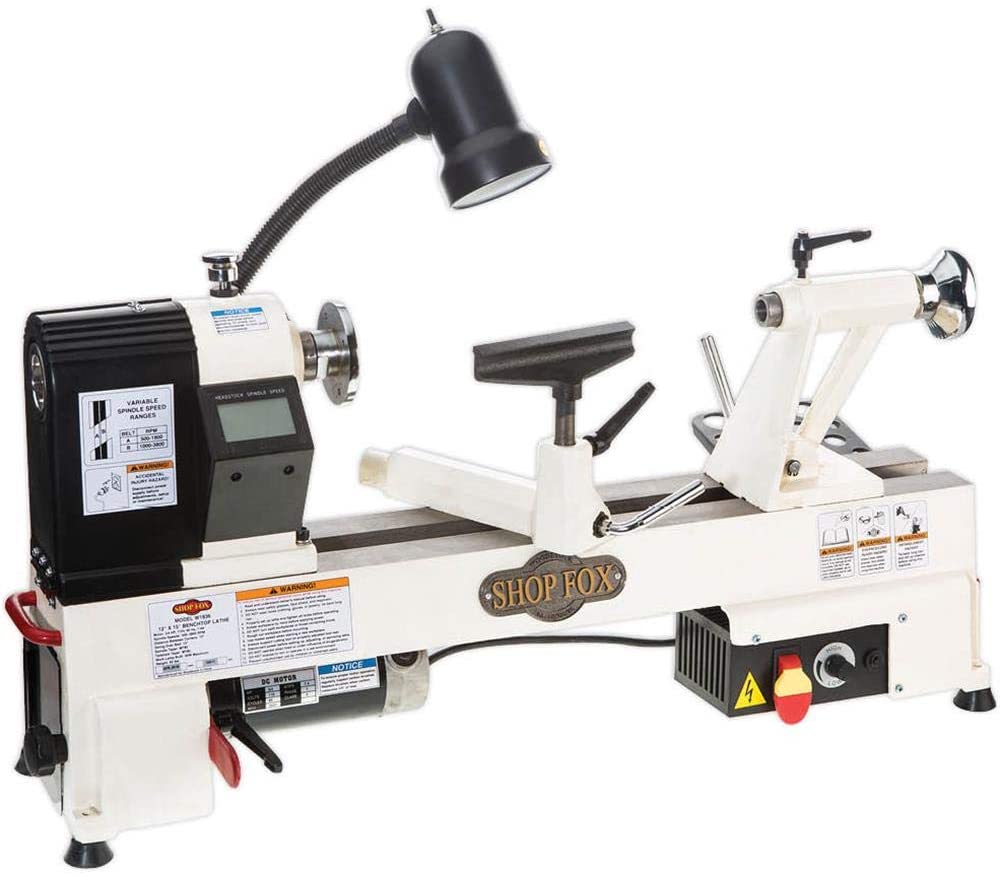
- 12″ swing and 15″ between centers
- Motor: 3/4 HP, 110V, universal, 7.4A
- Speed: 500-1800 RPM & 1000-3800 RPM
- Electronic Variable speed
- Swing over tool rest base: 9″
- Spindle tapers: #2MT
- Tailstock taper: #2MT
- Spindle thread: 1″ X 8 TPI RH
- Weight: 85 lbs
- Warranty: 2 years
This lathe offers practical features for a reasonable price. This lathe packs in useful features like a digital readout, DC electronic variable speed motor, two spindle speed pulley settings, and an attached LED light. At just 85 pounds, it’s easy to move around thanks to two convenient lifting handles—super handy when setting up or rearranging your workspace.
Though the manual says there are 15 inches between centers, you can squeeze out an extra inch for a bit more room on this 3/4 HP machine. One quirk: the tachometer shows 4300 RPM at full speed, despite the manual capping it at 3800. Also, the digital readout can lag slightly in response time.
The safety bump switch is a standout—it’s flexible and positioned perfectly for quick hip bumps if your hands are tied up during turning. A belt cover keeps things safe by protecting the pulleys, though you’ll need to flip it open for manual rotation or indexing, making it both helpful and a bit inconvenient.
Overall? It’s an okay lathe with solid features that get the job done.
Key Features
- Speed Range: 500-1800 RPM & 1000-3800 RPM with digital readout.
- Safety Switch: Convenient bump switch for quick shut-off.
Concerns & Solutions
- The gooseneck LED light is short and can be sloppy. Adding a sturdy gooseneck lamp can solve this. Check out our best LED lathe light post for some great options.
- The RPM screen position can be inconvenient but is not a dealbreaker.
- The tool rest is not smooth and has sharp and rough edges. You can grind this a little or replace it with a new tool rest.
Best Midi Wood Lathe FAQs
What is a midi wood lathe?
Midi wood lathes sit perfectly between pen-making mini lathes and full-sized standard models. They’re often seen as a powerful alternative for bowl turning without jumping to a full-size setup. While some dismiss the term midi as just a marketing label, these lathes genuinely offer advancements and distinct features worth noting.
With a little creativity, you can elevate a midi lathe to near full-size functionality—just add a wooden riser block, extra tool rest, or a bed extension. Sure, the horsepower won’t match a full-sized lathe, but it’s a solid compromise for most projects.
For more details on midi vs. mini lathes and an in-depth look at lathe parts, feel free to check out my other articles:
- What is a Mini Lathe?
- What is a Midi Lathe?
- Parts of a Lathe
How much does a midi wood lathe cost?
The best midi wood lathes reviewed here cost between $450 and $900. Basic models like Grizzly and Rikon are affordable for beginners, while higher-end models like Jet and Delta offer more features and durability.
If a midi lathe is out of your current budget, consider a mini lathe. Check out our post on the best mini wood lathes.
What projects can be made on a midi lathe?
On a midi lathe, you can tackle all the projects possible on a mini lathe, and then some! Turn a pen, muddler, and garden dibber and more ambitious pieces like medium-sized bowls and spindle projects—table legs, tool handles, and even decorative items—your creativity is the only limit. The extra swing and horsepower compared to mini lathes open up new possibilities, making it a versatile tool for both functional and artistic woodturning projects. For inspiration, take a look at our project ideas posts showcasing what’s possible on these powerful, compact machines.
Do I need a lathe stand for a midi lathe?
Most midi lathes will need a lathe stand that is purchased separately. You’re in luck! I’ve put together a list of the best lathe stands.
What is a good beginner wood lathe?
I would suggest you start with a good mini or midi. It’s more rational to accelerate steadily as you grow with your skills from time to time. You can use any of these midi lathes for a head start.
I have already done complete research on this, where I listed some best beginner wood lathes. I think it has all the information to help you to hit the bulls-eye.
If midi wood lathes are outside of your budget, consider a mini lathe. Check out our post on the best mini wood lathes.
How do I choose the right wood lathe?
When selecting a wood lathe, prioritize:
- Motor Power: Ensure sufficient torque for your projects.
- Build Quality: Look for sturdy construction and durable components.
- Customer Support: Choose brands known for excellent service and parts availability.
Midi lathes are a fantastic middle ground for both beginners and experienced turners. Take your time to find the right fit for your needs and workshop space. For more guidance, check out our tips for buying a wood lathe.
Last update on 2025-04-16 / Images from Amazon Product Advertising API
Best Midi Wood Lathe Final Thoughts
Investing in a wood lathe is a big decision. Read reviews, consider your project goals, and choose a lathe that enhances your woodworking journey. Whether you’re a beginner or expanding your workshop, these midi wood lathes deliver great value and performance. Be sure to invest in proper lathe safety gear, sharp woodturning tools, and additional accessories to elevate your woodworking experience.
Turn Big, Turn Safe. Welcome to the turning world!
Be sure to sign up for our free newsletter below for more buying guides and tips like this!
